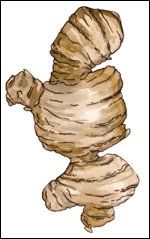Ginger Root Extract’s Potential in Colorectal Cancer Prevention
A small phase II clinical trial published in the Journal of Clinical Oncology has shown that consuming ginger root decreased harmful inflammatory prostaglandins in the colon and was tolerable and non-toxic.
A small phase II clinical trial published in the Journal of Clinical Oncology has shown that consuming ginger root decreased harmful inflammatory prostaglandins in the colon and was tolerable and non-toxic (DOI:10.1158/1940-6207.CAPR-11-0224). The trial participants taking ginger root extract had lower levels of colon inflammation markers compared to those taking placebo. The research team, which includes Suzanne Zick, assistant research professor at the University of Michigan Department of Family Medicine and others at the University of Pittsburgh and the Baylor College of Medicine believe the result warrants further trials in individuals that are at high risk for development of colorectal cancer.

The randomized, blinded study compared colon inflammation levels in 16 individuals taking daily ginger root extract with 17 individuals taking placebo. All study participants had normal risk for developing colon cancer with no evidence of disease or family history of the cancer. The experimental arm consumed 2 grams of ginger root supplement for 28 days. The dose-two grams of ginger extract-was chosen based on the highest tolerated dose in a phase I trial and because two grams of the extract is approximately 20 grams of raw ginger root, “a large, but not unreasonable amount to consume” in one’s diet according to the researchers. The composition of the ginger root extract was tested biochemically to measure the amount of active gingerols and shogaols that are responsible for the therapeutic properties of ginger.
Gingerols and shogaols are two components of ginger that are known to have both both antioxidant and anti-inflammatory actions. While the way that ginger exerts its anti-carcinogenic function is still being teased out, it is known from animal models that ginger inhibits several different lipoxygenases (LOX) and cyclooxygenases (COX) enzymes. These enzymes have a role in the formation of eicosanoids, including prostaglandins, which have a pro-inflammatory function. Mouse models have shown that ginger can be preventive of colon carcinogenesis but not in the treatment of early stage colonic tumors. What makes ginger an attractive colorectal carcinogenesis preventive agent is that it not only impacts the metabolism of the COX enzymes, but also other eicosanoid enzymes, potentially shifting these pathways towards an anti-inflammatory state in the gut.
Ginger root has had a long tradition of easing gastrointestinal distress. Its effects on the digestive tract have recently been supported by scientific research that shows ginger has important therapeutic properties that include antioxidant effects, direct anti-inflammatory effects and the inhibition of the formation of certain inflammatory compounds. Ginger’s anti-inflammatory effects have also been demonstrated for those with osteoarthritis or rheumatoid arthritis that consume ginger on a daily basis.
Not surprisingly, ginger root is one of the most consumed dietary agents worldwide and is one of the most-bought herbal supplements in the United States.
The participants of the study underwent signmoidoscopies prior to the study and following the 28-day regimen. Biopsies were analyzed for colon inflammation levels including the levels of eicosanoid enzymes such as prostaglandins. Prostaglandin E2 (PGE2), an inflammatory eicosanoid produced during early colorectal cancer development, was decreased by 28.0% on average, and by 7% when normalized to protein from baseline colon mucosal levels. Interpretation of this result will have to await more research, however, as the amount PGE2 needs to be decreased in colonic mucosa in order to prevent cancer-onset is not yet known.
The authors suggest that a larger trial in individuals at high-risk for colorectal cancer is warranted based on the results of this phase II trial to test whether ginger also has an anti-inflammatory effect in these individuals. Additionally, the mechanisms of anti-inflammation and antioxidant function of ginger components need to be studied and their effects of the COX and LOX pathways of inflammation and anti-inflammatory eicosanoids.